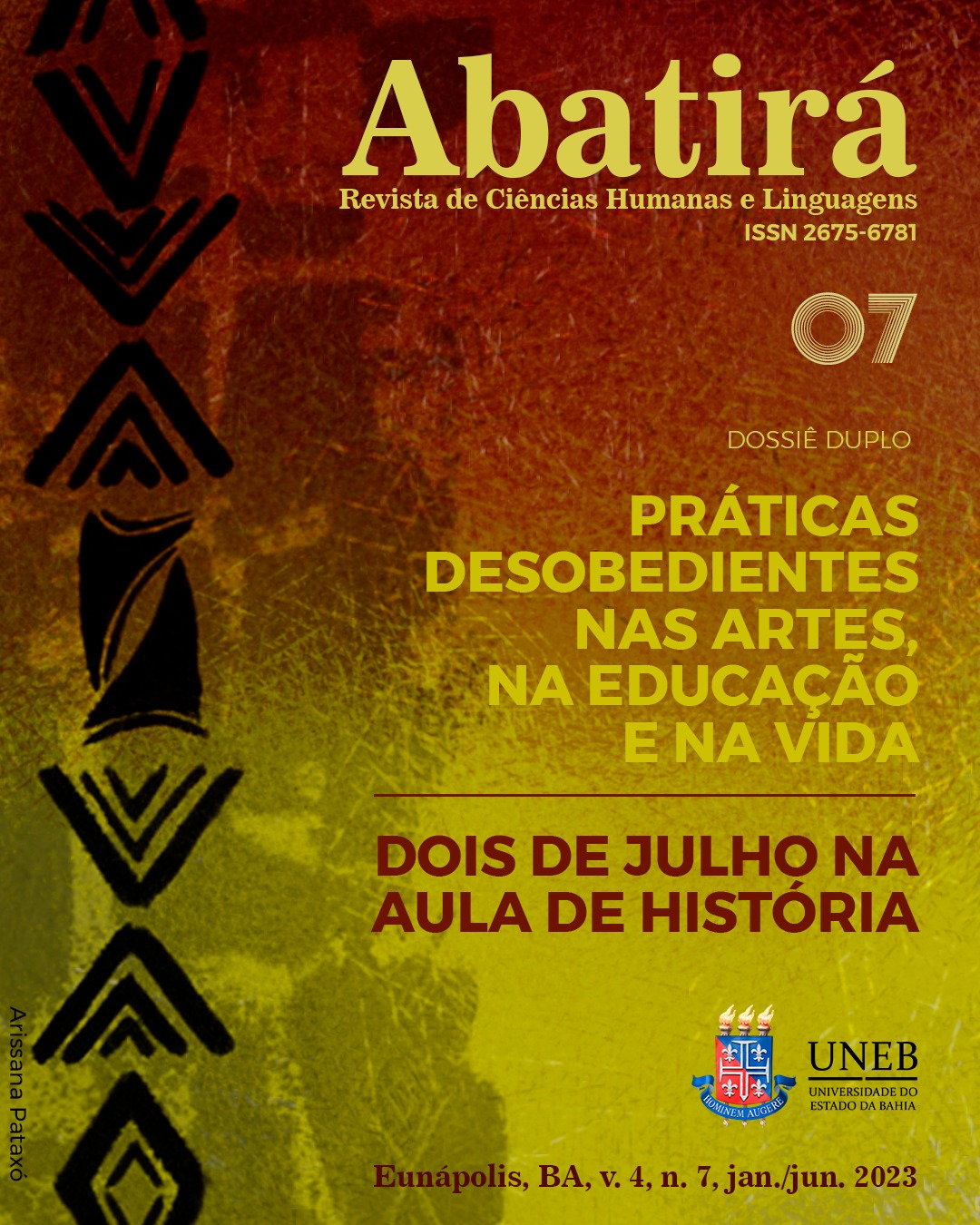From the creation of bodies, families and knowledge of axé (Belmonte-Bahia)
Keywords:
Ancestry, Bodies, Knowledge, GenderAbstract
From four reports of experience of candomblé adherents in the city of Belmonte/BA, three women from the same biological family and the same terreiro, and a Babalorixá from another biological family and another terreiro, the article investigates how the processes of insertion in candomblé are related to the transmission of knowledge based on ancestry. Thus, it is shown that such processes are characterized by trajectories of healing of physical, psycho-emotional and spiritual diseases brokered in the creation of bodies and family bonds that occurs in the environment of the terreiros, along with practices of transmission of knowledge not reducible to the logic of modern biology and medicine. In this way, it points to other forms of understanding of gender categories other than those dominant in comprehensive society.
Downloads
References
BARBOSA, A. Mitologia dos Orixás: lições e aprendizados. São Paulo: Anúbis, 2014.
BERNARDO, T. Negras, Mulheres e Mães: Lembranças de Olga de Alaketo. 1ª ed. São Paulo: Arole Cultural, 2019.
BUENO, W. DE C.; ANJOS, J. C. DOS. Da interseccionalidade à encruzilhada: Operações epistêmicas de mulheres negras nas universidades brasileiras. Civitas - Revista de Ciências Sociais, v. 21, n. 3, p. 359-369, 7 dez. 2021.
CAPUTO, S. G. Aprendendo yorubá nas redes educativas dos terreiros: história, culturas africanas e enfrentamento da intolerância nas escolas. Revista Brasileira de Educação. vol. 20, núm. 62, jul/set, pp. 773-796. 2015.
DELEUZE Gilles e GUATTARI Félix. Introdução: Rizoma. Texto extraído de Mil Platôs (Capitalismo e Esquizofrenia) Vol. 1. Editora 34, 1ª Ed. (1995) (Esgotado) Tradução de Aurélio Guerra Neto e Célia Pinto Costa.
FLAKSMAN, C. "De sangue" e "de santo": o parentesco no candomblé. Mana [online]. 2018, vol.24, n.3, pp.124-150. ISSN 1678-4944. https://doi.org/10.1590/1678-49442018v24n3p124.
GOLDMAN, M. Os tambores dos mortos e os tambores dos vivos. Etnografia, antropologia e política em Ilhéus, Bahia. Revista de Antropologia, [S. l.], v. 46, n. 2, p. 423-444, 2003. DOI: 10.1590/S0034-77012003000200012. Disponível em: http://www.revistas.usp.br/ra/article/view/27171. Acesso em: 10 set. 2020.
OLIVEIRA. C. S. Conhecimento religioso: uma autoenografia de reconstrução de vida pelo candomblé. (Trabalho de Conclusão de curso do Bacharelado de Antropologia da UFSB). Porto Seguro, 2021, 73 pp.
OLIVEIRA. C. S. A ancestralidade nos rituais de cura: as narrativas dos ebós. Revista Encantar - Educação, Cultura e Sociedade, Programa de Pós- Graduação em Ensino e Relações Étnico-Raciais da Universidade Federal do Sul da Bahia. V. 1, n. 2, p. 216-222, mai./ago. 2019. ISSN 2675-1291. Disponível em: https://www.revistas.uneb.br/index.php/encantar/article/view/8549 Acesso em: 20 mar. 2021.
PIMENTA, P. G. Samba de Roda das Marisqueiras: corpos e instrumentos em luta. (Dissertação de mestrado do Programa de Pós-Graduação em Estado e Sociedade da Univ. Federal do Sul da Bahia (PPGES/UFSB). Porto Seguro, 2020, 198 pp.
PRANDI, R. Mitologia dos orixás. 9. ed. São Paulo: Companhia das Letras, 2001. 591 p. ISBN 978-85-359-0064-4. Disponível em: https://lelivros.love. Acesso em: 20 out. 2020.
RABELO, M. Obrigações e a construção de vínculos no candomblé. Mana, Rio de Janeiro, v. 26, n. 1, e261201 abr. 2020.
SILVA, D. dos Santos. “As Nagôs estão na rua com prazer e alegria”: uma cartografia afro-baiana de Belmonte-Bahia. Dissertação de Mestrado. Porto Seguro: Programa de Pós-Graduação em Relações étnico-Raciais da Univ. Federal do Sul da Bahia (PPGER/UFSB). Porto seguro, 2019, 151 pp.
SILVA, V. G. da. Candomblé e umbanda: Caminhos da devoção. 5ª ed. São Paulo: Selo Negro, 2005.
Downloads
Published
How to Cite
Issue
Section
License
Copyright (c) 2023 Cátia Santos Oliveira, Ana Carneiro Cerqueira

This work is licensed under a Creative Commons Attribution 4.0 International License.

Este trabalho está licenciado sob uma licença Creative Commons Attribution 4.0 International License.Você é livre para:
Compartilhar - copia e redistribui o material em qualquer meio ou formato; Adapte - remixe, transforme e construa a partir do material para qualquer propósito, mesmo comercialmente. Esta licença é aceitável para Obras Culturais Livres. O licenciante não pode revogar essas liberdades, desde que você siga os termos da licença.
Sob os seguintes termos:
Atribuição - você deve dar o crédito apropriado, fornecer um link para a licença e indicar se alguma alteração foi feita. Você pode fazer isso de qualquer maneira razoável, mas não de uma forma que sugira que você ou seu uso seja aprovado pelo licenciante.
Não há restrições adicionais - Você não pode aplicar termos legais ou medidas tecnológicas que restrinjam legalmente outros para fazer qualquer uso permitido pela licença.





